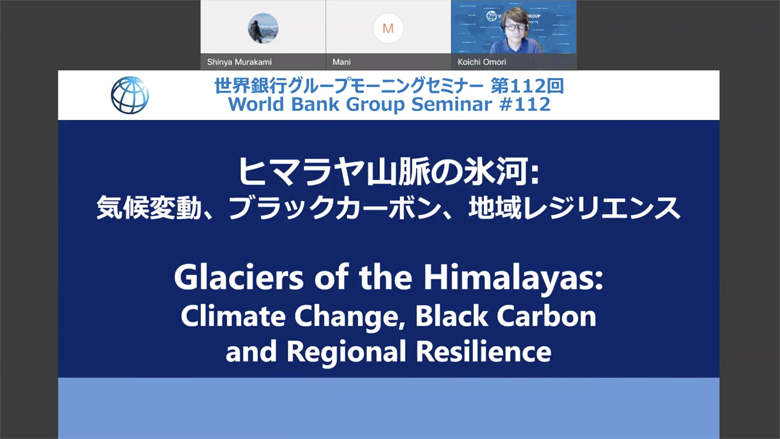Black carbon deposits originating from factories, cooking and vehicles are compounding the effects of climate change to speed up the melting of the Himalayan glaciers. More aggressively curbing black carbon emissions can slow glacier melt and improve the security of water resources in the region, according to a new World Bank report.
Current policies in place to reduce black carbon emissions – through enhancing fuel-efficiency standards, phasing out diesel vehicles and promoting electric cars – while laudable, will still reduce black carbon deposits by only 23 percent, not enough to prevent an acceleration of water releases from glacier melt in the region, according to Glaciers of the Himalayas: Climate Change, Black Carbon and Regional Resilience. However, new economically and technically feasible policies are within reach to contain glacier melt at current levels.
At this online seminar, Muthukumara Mani, lead economist in the World Bank’s South Asia region and a lead author of the report, introduced the main findings of the report.
Date/Time:
8am-9am, Friday, July 9, 2021 (Japan Standard Time)
Speaker:

Lead Economist, Office of the Chief Economist for South Asia Region, World Bank
Muthukumara Mani is a Lead Economist in the South Asia Chief Economist’s Office with over twenty years of experience leading environmental projects, policy dialogue, analytical work and capacity building activities. He has operational experience in both the World Bank and IMF leading green growth and climate change policy dialogue, including from field office locations. He has delivered a number of high impact and policy relevant knowledge products in sustainable development area.
He primarily works on climate change mitigation and adaptation issues, water and environmental issues in the region. Prior to joining the South Asia region, he led the World Bank's work on assessing environmental implications of development policy lending reforms in the Environment Department of the World Bank. Prior to joining this position, Dr. Mani was an economist in the Fiscal Affairs Department of the International Monetary Fund, where he was responsible for analyzing environmental implications of macroeconomic policies and programs, and in integrating environmental considerations broadly in the IMF country programs. Dr. Mani has numerous books, journal publications and policy papers. a doctorate and master’s in economics from the University of Maryland, College Park.
Presentation material:
Glaciers of Himalayas (PDF)
Related Seminars
World Bank Group Morning Seminar
Subscribe to the World Bank Group Live Stream YouTube channel for more videos.
